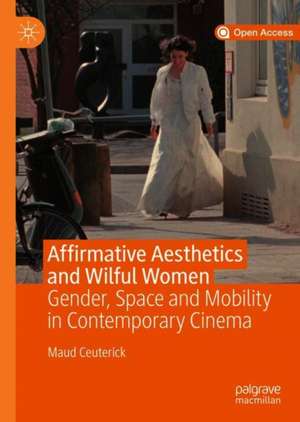Affirmative Aesthetics and Wilful Women: Gender, Space and Mobility in Contemporary Cinema
Autor Maud Ceutericken Limba Engleză Hardback – 27 oct 2020
| Toate formatele și edițiile | Preț | Express |
|---|---|---|
| Paperback (1) | 208.16 lei 6-8 săpt. | |
| Springer International Publishing – 27 oct 2021 | 208.16 lei 6-8 săpt. | |
| Hardback (1) | 220.97 lei 6-8 săpt. | |
| Springer International Publishing – 27 oct 2020 | 220.97 lei 6-8 săpt. |
Preț: 220.97 lei
Nou
Puncte Express: 331
Preț estimativ în valută:
42.31€ • 43.40$ • 35.62£
42.31€ • 43.40$ • 35.62£
Carte tipărită la comandă
Livrare economică 26 februarie-12 martie
Preluare comenzi: 021 569.72.76
Specificații
ISBN-13: 9783030370381
ISBN-10: 3030370380
Pagini: 165
Ilustrații: XVI, 186 p. 40 illus., 38 illus. in color.
Dimensiuni: 148 x 210 mm
Greutate: 0.4 kg
Ediția:1st ed. 2020
Editura: Springer International Publishing
Colecția Palgrave Macmillan
Locul publicării:Cham, Switzerland
ISBN-10: 3030370380
Pagini: 165
Ilustrații: XVI, 186 p. 40 illus., 38 illus. in color.
Dimensiuni: 148 x 210 mm
Greutate: 0.4 kg
Ediția:1st ed. 2020
Editura: Springer International Publishing
Colecția Palgrave Macmillan
Locul publicării:Cham, Switzerland
Cuprins
1. Introduction: Affirmative ethics, wilfulness, and affects as forms.- 2. Urban wanderer and wilful performances: Head-on (Gegen die wand).- 3. Housing wilfulness: Wadjda.- 4. Lived body, affects and cars: Friday night (Vendredi soir).- 5. Conclusion: Affirmative aesthetics.
Notă biografică
Maud Ceuterick is a Marie Skłodowska-Curie research fellow in Digital Culture at the University of Bergen, Norway. She has previously published on the ‘road movie’ genre, gender and domesticity in transnational cinema, and space tourism in film.
Textul de pe ultima copertă
While the idea of women who stay at home and men who dominate the streets may seem outdated, binary considerations of gender, space, and power still proliferate in contemporary cinema. This open access book adopts a fluid approach to space designed to accommodate wilful, affirmative, and imaginative perspectives of gender on screen. Through close analysis, or micro-analysis, of Messidor (Alain Tanner, 1979), Vendredi Soir (Claire Denis, 2002), Wadjda (Haifaa Al-Mansour, 2012), and Head-On (Fatih Akin, 2004), this book looks for light, textures, rhythms, movement, and sound that give shape to affirmative forms, forms that contribute to rewriting bodies and spaces—such as cars, homes, and city streets—that reject traditional gender and power structures. Wilful women drive this book forward, through movement and pauses, imagination and desire, persistence and dissimulation, eroticism, performance and abjection.
Caracteristici
Provides an affirmative approach to feminism and film Explores case studies of films that are wilful to change the status quo, deconstructing the binary social distinctions created and reinforced by many films Uses a micro-analysis of four films to show how bodies and forms have the potential to revise women's current relations to space
